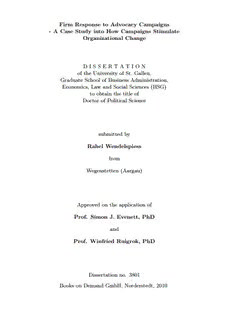
Firm Response to Advocacy Campaigns - Please identify yourself PDF
Preview Firm Response to Advocacy Campaigns - Please identify yourself
Firm Response to Advocacy Campaigns - A Case Study into How Campaigns Stimulate Organizational Change D I S S E R T A T I O N of the University of St. Gallen, Graduate School of Business Administration, Economics, Law and Social Sciences (HSG) to obtain the title of Doctor of Political Science submitted by Rahel Wendelspiess from Wegenstetten (Aargau) Approved on the application of Prof. Simon J. Evenett, PhD and Prof. Winfried Ruigrok, PhD Dissertation no. 3801 Books on Demand GmbH, Norderstedt, 2010 The University of St. Gallen, Graduate School of Business Administration, Economics, Law and Social Sciences (HSG) hereby consents to the printing of the present dissertation, without hereby expressing any opinion on the views herein expressed. St. Gallen, May 17, 2010 The President: Prof. Ernst Mohr, PhD To My Parents Every Path We Take Leads to Fantasies about the Path not Taken –Halcom (Patton 2002, 257) Abstract Increasingly, advocacy campaigns challenge companies to take social responsibility along global supply chains. To prepare for such situations, stakeholder management argues for proactive firm strategies and corporate communications promotes early identification of is- sues. Considerable research has been conducted about susceptibility of campaigns but it still is inconclusive about the relative importance of institutional factors and firm attributes. Much attention also is given to private politics and the evolvement of global non-state gov- ernance systems (private standards and certification). Firm-level responses and outcomes of campaigns are discussed mainly as corporate social responsibility, addressing firm policy (e.g., codes of conduct) and reporting procedures. Little attention has been given so far to firm organizational-level factors that influence firm response. Also, only seldom have campaigns been addressed as triggers for organizational change. Some contributions are identified in the literature of organizational learning and about personal preferences of managers. This thesis contributes to this research gap by applying a process model of firm response to advocacy campaigns that build on literature of sensemaking in organizations. A qualitative approach has been chosen to study a situation in which the issue under focus interlaces with the context. Interview, documentary, and archival data of four companies has been collected to conduct a multiple case study (Nestl´e and Kraft in the coffee sector and Blackout and Mammut in the clothing sector). The research process has involved building categories for a cross-indexing procedure according to qualitative content analysis, supported by the software MAX qda. Theresultsindicatethatfirmresponseismoresubtlethanproposed. Twotypesofchanges areidentified. First, categoricalchangeisreportedinmoreopenfirmposture. Second,relative change is reported in legitimation, justification, transparency, and commitment. No notable change is reported in identity orientation and consistency. The findings do not support claims of cultural transformation and they also contradict arguments that blame firms for only green-washing their image. The results support that campaigns are input for organizational learning. Consequently, further research may consider firm posture as dependent variable of firm response to advocacy campaigns. These findings indicate that firms are likely to become aware of the underlying campaign issue. Campaign managers may notice that campaigns have an impact on firms and facilitate change of business practices. However, firms are not likely to adapt to specific claims. They develop their own initiatives consistent with their strategies. Zusammenfassung Zunehmend fordern Interessengruppen mittels Kampagnen Firmen heraus, soziale Verant- wortung entlang ihrer globalen Wertscho¨pfungsketten wahrzunehmen. Zur Vorbereitung schla¨gt Stakeholder Management proaktive Firmenstrategien vor und die Unternehmenskom- munikation befu¨rwortet Fru¨herkennung von Issues. Zahlreiche Beitr¨age haben sich mit der Empf¨anglichkeitvonFirmen fu¨rKampagnen bescha¨ftigtaber sie sindnichtschlu¨ssigbzgl. des Einflusses von institutionellen und firmenbezogenen Faktoren. Grosse Aufmerksamkeit wird auch nicht-staatlichen Governance-Systemen geschenkt (z. B. Zertifizierung). Antworten von Firmen auf Kampagnen werden haupts¨achlich in den Bereichen Firmenverantwortung, Verhaltensregeln und Reporting thematisiert. Bisher wurde organisatorischen Faktoren, die Antworten von Firmen beeinflussen, wenig Aufmerksamkeit geschenkt. Zudem wurden Kam- pagnen bisher kaum als Ausl¨oser von organisationalen Vera¨nderungen gesehen. Einige solcher Beitr¨age k¨onnen in der Literatur der lernenden Organisation und in den Pr¨aferenzen von Fu¨hrungskra¨ften identifiziert werden. Die vorliegende Studie tr¨agt zu dieser Forschungslu¨cke bei indem sie ein Prozessmodell, das auf der Literatur von Sensemaking in Organisationen aufbaut, auf Firmenreaktionen auf Kampagnen von Interessengruppen anwendet. Fu¨r diese Studie wurde ein qualitativer Ansatz gew¨ahlt, weil das Thema mit dem Kontext verwobenist. Interviews, DokumenteundArchivdatenvonvierFirmenwurdenfu¨rdievergle- ichende Fallstudie verwendet (Nestl´e und Kraft aus dem Kaffee- und Blackout und Mammut aus dem Bekleidungssektor). Der Forschungsprozess beinhaltete Kategorienbildung und In- dexierung gem¨ass qualitativer Analyse, unterstu¨tzt durch das Computerprogramm MAX qda. Die Resultate zeigen, dass Firmenantworten auf Kampagnen komplex sind. Beachtliche ¨ Anderungen wurden durch offenere Firmenhaltung verzeichnet. Relative Ver¨anderungen wur- denbzgl. Legitimierung, Rechtfertigung, Transparenzund Verbindlichkeitidentifiziert. Keine bemerkenswerten Vera¨nderungen gab es bei der Firmenidentita¨t und der Konsistenz. Die Re- sultate widerlegen Argumente, die kulturelle Transformation vorhersagen. Sie entkra¨ften aber auch den Vorwurf, Firmen vergru¨nen lediglich ihr Image. Die Resultate stu¨tzen Argumente, dass Kampagnen Input fu¨r organisatorisches Lernen sind. Weitere Studien k¨onnten die Fir- menhaltung als abh¨angige Variable beru¨cksichtigen. Die Resultate beinhalten weiter, dass Firmen, die mit Kampagnen konfrontiert sind, sich des zugrunde liegenden Themas bewusst werden. Kampagnenfu¨hrendesolltenberu¨cksichtigen,dassKampagnenzwarVer¨anderungvon Firmenpraktiken unterstu¨tzen. Allerdings antworten Firmen nicht unbedingt auf spezifische Forderungen sondern entwickeln eigene Initiativen.
Description: